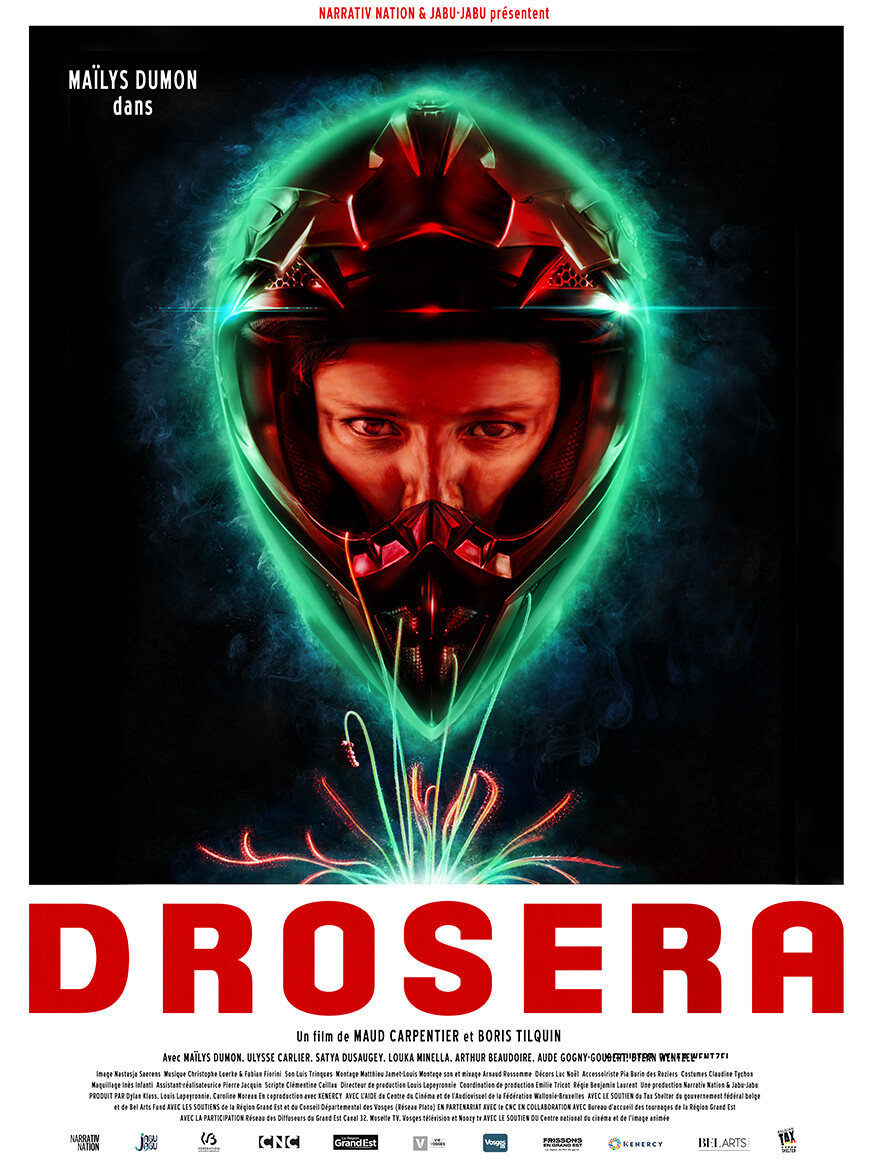Boris TIlquin & Maud Carpentier
2025
Belgium, France
France
fiction
drama | coming of age | fantastic
23 minutes
Narrativ Nation | co-produced by Jabu Jabu
Alice, a sixteen-year-old motocross champion, is mysteriously brought back to life by a carnivorous plant after a violent trauma. But as she struggles to find her footing again, she discovers she now has extraordinary powers.
Alice | Maïlys Dumon
Joachim | Ulysse Carlier
François | Satya Dusaugey
Rémy | Louka Minnella
Liam | Arthur Beaudoire
Kelly | Aude Gogny Goubert
Tarek | Dylan Wentzel
Writers-Directors | Boris Tilquin, Maud Carpentier
Director of Photography | Nastasja Saerens
Chief Film Editor | Matthieu Jamet
Chief Sound Editor | Arnaud Rossome
Production | Dylan Klass (Narrativ Nation), Louis Lapeyronnie (Jabu Jabu), Caroline Moreau (Jabu Jabu)
World Premiere Soon.
Boris Tilquin is a Belgian writer based in Brussels. He has degrees in Philosophy, Cultures and Cinematographic Thought, Editing/Scriptwriting and Screenwriting. He was awarded the prize for best screenplay at the Le court en dit long festival in 2017. Between 2019 and 2021, Boris Tilquin was Vice-President of the Association des scénaristes de l'Audiovisuel (Brussels). Since 2022, he has been a writer-director. His first co-directed feature-length documentary was selected for the Rotterdam Festival 2025. Drosera, co-directed with Maud Carpentier, is his first short fiction film.
Maud Carpentier is a scriptwriter based in Brussels. A graduate in communications (UCL) and screenwriting (IAD), she has been writing for series and short films since 2017. In 2018, she received the best screenplay award at the Le Court en Dit Long festival. She is the co-creator of the fantasy series Ghost Society (in development) and Alma, a hospital thriller currently in production. This year sees the release of Drosera, her first short fiction film, co-written and co-directed with Boris Tilquin.
Maud Carpentier
– Pablo by Sergio Guataquira Sarmiento
Co-writer (short film, 2016)
– Henri by Hugo Salvaire
Co-writer (short film, 2017)
– Derrière le sourire by Adriana Dafonseca
Co-writer (short film, 2025)
– Drosera by Maud Carpentier & Boris Tilquin
Co-writer & Co-director (short film, 2025)
– Vital
Co-creator & Writer (TV series, 2025)
Boris Tilquin
– Du bout des doigts by Basile Vuillemin
Writer (short film, 2014)
– Jolis Mômes by Thomas Xhignesse
Writer (short film, 2016)
– Rien lâcher by Guillaume Kerbush & Laura Petrone
Writer (short film, 2018)
– Fils de
Co-creator & Writer (TV series, 2020)
– Drosera by Maud Carpentier & Boris Tilquin
Co-writer & Co-director (short film, 2025)
– Heysel 1985, Dans l’enfer de la foule by Christophe Hermans & Boris Tilquin
Co-director (feature documentary, 2025)
– Merckx by Christophe Hermans & Boris Tilquin
Co-director (feature documentary, 2025)
The directing style deliberately draws from mainstream cinema, referencing familiar “teenage” tropes — the predatory group of boys, the oblivious parents, the older actors playing younger roles, etc. — along with the iconography of fantasy genre films. While the film remains grounded in the rural motocross setting, the cinematography and sound design gradually build a supernatural aesthetic. As the film progresses, the colors — red and black — become more intense, mirroring the growing radicalization of the heroine. As Alice begins to enact her revenge, her journey takes on the shape of a supervillain origin story, directly inspired by the language of comic books.
The filmmakers’ personal experiences — including school bullying and domestic violence — fuel a moral dilemma explored in all its complexity. Is Alice finding liberation, or is she losing herself in a self-destructive cycle? The immersive portrayal of cathartic violence pushes the viewer into moral discomfort. Though it may seem that Alice is entitled to revenge — a right largely shaped by narrative convention and a kind of popular cinematic morality — doesn’t this act of retribution, this answer to harm with harm, risk triggering a new cycle of violence?
DROSERA uses the codes of genre cinema to explore the full ambiguity of the carnivorous plant symbol — a fragile yet predatory organism. This duality is developed in the script and deepened through the visual storytelling of a destructive metamorphosis. The film’s climax, marked by the birth of a fully assumed supervillain, provokes both exhilaration and unease. In doing so, the film invites reflection on the tropes of mainstream cinema and the templates we so rarely question. DROSERA seeks to be both cathartic and critical.
